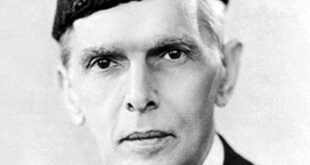Essay on Allama Iqbal: Allama Iqbal was a renowned poet, philosopher, and politician from British India. He is widely recognized for his inspirational poetry and his instrumental role in the creation of Pakistan. Allama Iqbal is often referred to as the “Spiritual Father of Pakistan.” His poetry focused on themes of self-discovery, spiritual awakening, and the empowerment of the individual. His vision for a separate Muslim state played a significant role in the eventual formation of Pakistan in 1947.

Essay on Allama Iqbal
Allama Iqbal, a name that resonates with pride and inspiration in the hearts of many, is considered one of the most significant figures in the history of South Asia. This essay explores the life, works, and impact of this remarkable poet, philosopher, and politician.
Early Life and Education:
Allama Iqbal, whose full name was Muhammad Iqbal, was born on November 9, 1877, in Sialkot, a city in British India, which is now part of Pakistan. From an early age, he displayed a deep love for literature and a strong thirst for knowledge. This passion for learning led him to pursue his education with great determination. He completed his initial education in Sialkot and later went on to study at Government College Lahore. Iqbal’s educational journey took him to the United Kingdom, where he earned a degree in philosophy from the University of Cambridge. He continued his studies in Europe and completed his doctorate from the University of Munich, Germany.
Philosophy and Poetry:
Allama Iqbal’s poetry is a reflection of his profound philosophical ideas. He believed in the importance of self-discovery and individualism. His poetry encourages people to realize their inner potential and aspire for greatness. Through verses rich in metaphor and symbolism, Iqbal conveyed his message of self-empowerment, spirituality, and love for one’s homeland.
Influence on the Pakistan Movement:
Allama Iqbal’s vision played a pivotal role in the creation of Pakistan. He envisioned a separate homeland for Muslims in British India, where they could preserve their cultural and religious identity. His famous Allahabad Address in 1930 galvanized the idea of a separate Muslim state, which eventually led to the formation of Pakistan in 1947.
Legacy and Recognition:
Allama Iqbal’s contributions to literature, philosophy, and politics have earned him immense recognition. He is often referred to as the “Spiritual Father of Pakistan” and is considered one of the founding fathers of the nation. His poetry continues to be a source of inspiration for people in Pakistan and around the world.
Vision for Pakistan:
Allama Iqbal’s influence on the political landscape of British India was profound. He envisioned a separate homeland for Muslims where they could preserve their cultural and religious identity. His famous Allahabad Address in 1930 is a landmark moment in the history of the Pakistan Movement. In this address, he outlined the idea of a separate Muslim state, which later became Pakistan in 1947.
Final Years and Passing:
Allama Iqbal’s health began to deteriorate in the later years of his life. He passed away on April 21, 1938, leaving behind a rich literary and philosophical legacy that continues to influence generations.
Self-Realization and Individuality:
At the core of Iqbal’s philosophy is the idea of self-realization. He believed that each individual possesses immense potential and that true greatness can be achieved by recognizing and harnessing that potential. His poetry often encourages people to look within themselves, discover their unique talents, and strive for self-improvement.
Spiritual Awakening:
Iqbal’s philosophy is deeply rooted in spirituality. He emphasized the importance of a strong spiritual connection and believed that it was the key to achieving higher moral and ethical standards. His poetry often encourages individuals to seek a deeper understanding of their spiritual selves and to develop a connection with the divine.
Unity of the Muslim Ummah:
Allama Iqbal was a strong advocate for the unity of the Muslim community, or the Ummah. He believed that the disunity among Muslims had weakened their collective strength and influence. He envisioned a united front of Muslims that would be based on common values and beliefs.
Role of the Individual in Society:
Iqbal’s philosophy extends to the role of individuals in society. He believed that individuals should not only focus on their personal development but also contribute to the betterment of society as a whole. He encouraged individuals to take an active role in social, political, and economic reforms.
The Idea of an Ideal State
Iqbal’s vision for a separate Muslim state, which played a pivotal role in the creation of Pakistan, was grounded in his philosophy. He believed that a separate state was necessary to preserve the cultural and religious identity of the Muslim community, allowing them to live according to their own principles and values.
Allama Iqbal’s philosophy is a blend of individualism, spirituality, and a call for collective unity. His writings and poetry continue to inspire people to explore their inner potential, to strengthen their spiritual connection, and to work towards the betterment of society. His ideas have left an enduring legacy, not only in Pakistan but around the world, as they promote self-improvement, spiritual growth, and a sense of responsibility toward one’s community and nation.
Allama Iqbal’s Role in the Pakistan Movement
The Pakistan Movement, which led to the creation of the independent nation of Pakistan in 1947, owes much of its intellectual and ideological foundation to the visionary leadership of Allama Iqbal. His philosophical and political contributions played a pivotal role in inspiring and mobilizing the masses for the cause of a separate Muslim state in South Asia.
1. The Allahabad Address (1930):
One of the most iconic moments in the history of the Pakistan Movement was Allama Iqbal’s historic address at Allahabad in 1930. In this address, he presented the idea of a separate Muslim state in British India. He argued that the Muslims of India should unite and establish their own nation to preserve their cultural and religious identity.
2. Poetic and Philosophical Inspiration:
Iqbal’s poetry and philosophical writings were instrumental in shaping the intellectual landscape of the Pakistan Movement. His works, particularly his Persian and Urdu poetry, encouraged self-discovery, self-empowerment, and the realization of the Muslims’ distinct identity. His poetry inspired many to take up the cause of an independent Muslim state.
3. Leadership and Political Activism:
Although primarily known as a poet and philosopher, Allama Iqbal was also politically active. He was a member of the All-India Muslim League and used his influence to advocate for the rights of the Muslim community. His support for the Pakistan Movement added intellectual and moral weight to the cause.
4. Influence on Muhammad Ali Jinnah:
Allama Iqbal’s ideas and vision greatly influenced Muhammad Ali Jinnah, the leader of the Pakistan Movement and Pakistan’s founding father. Jinnah adopted and championed Iqbal’s vision of a separate Muslim state, using it as the cornerstone for his political endeavors.
5. The Lahore Resolution (1940):
The Lahore Resolution, also known as the Pakistan Resolution, was a significant milestone in the Pakistan Movement. It was adopted during the annual session of the All-India Muslim League in Lahore in 1940. The resolution, inspired by Iqbal’s vision, called for the creation of an independent Muslim state in British India.
Allama Iqbal’s role in the Pakistan Movement was one of profound intellectual leadership and vision. His Allahabad Address, his philosophical works, and his influence on key leaders like Muhammad Ali Jinnah all contributed to the eventual realization of Pakistan as an independent nation. His legacy as the “Spiritual Father of Pakistan” endures, and he is celebrated as a key architect of the nation’s ideology and identity.
FAQs
Q1. Who was Allama Iqbal?
Allama Iqbal, whose full name was Muhammad Iqbal, was a renowned poet, philosopher, and politician in British India. He is celebrated for his inspirational poetry and his influential role in the creation of Pakistan.
Q2. What is Allama Iqbal’s most famous work?
Allama Iqbal’s most famous work is his poetry collection titled “Bang-e-Dra” (The Call of the Marching Bell). This collection contains some of his most significant and thought-provoking verses.
Q3. What was the significance of Allama Iqbal’s Allahabad Address in 1930?
Allama Iqbal’s Allahabad Address in 1930 was a landmark moment in the Pakistan Movement. In this address, he presented the idea of a separate Muslim state in India, which later became the foundation for the creation of Pakistan in 1947.
Q4. How did Allama Iqbal’s philosophy influence his poetry?
Allama Iqbal’s philosophy, grounded in self-realization, spirituality, and the unity of the Muslim Ummah, deeply influenced his poetry. His verses often encourage individuals to recognize their inner potential, connect with their spirituality, and work for the betterment of society.
Q5. What is Allama Iqbal’s legacy today?
Allama Iqbal’s legacy continues to inspire people not only in Pakistan but around the world. He is considered the “Spiritual Father of Pakistan” and is celebrated for his contributions to literature, philosophy, and the Pakistan Movement. His ideas of self-empowerment and unity remain relevant in contemporary society.
Recommended Post |
| 1: Advantages and Disadvantages of Internet |
| 2: Responsibilities of Good Citizen |
| 3: Essay on Village Life in Pakistan |
| 4: Essay on “A Morning Walk” |
| 5: Essay on Quaid-e-Azam |



